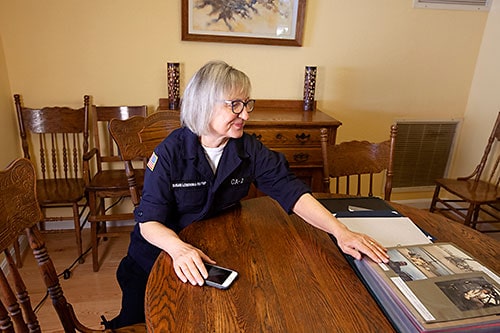Traveling the world to offer medical aid

When a plane full of people from Wuhan, China arrived at March Air Reserve Base last month, Claremonter Susan Lominska was ready to give aid.
The plane carried 195 American citizens who were living in Wuhan, the epicenter of the coronavirus outbreak, which has killed more than 2,120 people so far in China and led to widespread fears across the globe.
Ms. Lominska, a retired family nurse practitioner, is part of the Disaster Medical Assistance Team, which is an arm of the Department of Health and Human Services (HHS). At her home, she keeps a scrapbook full of places all around the world she has been deployed to, from Bosnia to the aftermath of the September 11th attacks to Beaumont, Texas, where she rendered aid to Hurricane Katrina victims.

“There was going to be a plane coming in taking people who were being evacuated from Wuhan and we needed to be available to go to March and supplement public health services,” Ms. Lominska said.
This time, she was traveling a shorter distance from her Claremont home to Moreno Valley to check up on the Wuhan “repatriates,” as they were called.
The plane landed at the base at 5:30 a.m., and Ms. Lominska and her team, comprised of health professionals from Riverside Public Health and the Center for Disease Control (CDC), went to work.
Ms. Lominska was methodical in how she described her scope of work—she checked blood pressures, did nasal swabs and oral swabs, made sick calls, gave breathing treatments, did well baby checks, secured chronic pain meds and attended to any kind of complaints the repatriates had.
At the time, there wasn’t a mandatory quarantine. It wasn’t until a few days later when the federal government issued the quarantine, the first of its kind in over 50 years. The repatriates were not allowed to leave the base for two weeks.
A fence was put up around the perimeter of the barracks in which the repatriates were residing, with a federal marshal stationed at the only entry point.
Ms. Lominska was only present at the base for the first four days of the quarantine. But she was able to paint a picture of daily life for a group of people who were uprooted from their home.
For the most part, she said, the group remained upbeat. But one young man told Ms. Lominska he felt like he was in a prison during the quarantine.
Individuals and families had their own rooms, and every two rooms shared one bathroom. Scooters and bicycles (and helmets) were provided for the children, and some repatriates taught kickboxing and Zumba classes to others to pass the time.
But there was an underlying current of worry.
Repatriates were concerned about family members, friends and jobs back in Wuhan. They told stories of daily life in the midst of the coronavirus outbreak—Wuhan, a modern metropolis with nearly nine million residents, was a ghost town unless you passed by a hospital, where lines of people would stretch for blocks.
Entire families were allowed to board the plane to March Air Reserve Base as long as they didn’t show any symptoms of the virus. But some were turned away.
“One person told me an entire family couldn’t go on [the plane] because one person in the party had symptoms,” Ms. Lominska said.
Some people didn’t know what the future would bring if they went back to Wuhan.
“They were stressed, but I feel like people were making the best of a stressful situation,” Ms. Lominska said.
Since December 2019, the coronavirus is to blame for over 2,000 deaths, mostly in China, with over 75,000 confirmed cases. As of February 19, 29 people in the United States had tested positive for the virus.
The proliferation of the virus in such a short amount of time has led to growing concern, but Ms. Lominska did not feel at risk when treating the repatriates.
“We’ve been trained in control measures, and fitted with masks, gowns and gloves,” she said. “I felt that was perfectly adequate.”
Besides, she said, she received training at a hospital in Nebraska that accepted Ebola patients in 2014.
Overall, none of the 195 people who were quarantined ever tested positive for the virus. Two children developed fevers and were sent to local hospitals, but neither one had coronavirus.
They were officially released on February 11, Ms. Lominska said.
Ultimately, while there is a good amount of paranoia surrounding the coronavirus, Ms. Lominska noted there are far more deaths from influenza than this new virus.
“I think we should be cautious of course, but I don’t think we have to be concerned about a lot of deaths in the US,” she said.
Ms. Lominska will talk about her experiences at March Air Reserve Base on Tuesday, February 25 at 11:30 a.m. during the University Club of Claremont meeting at the Hughes Center.
There is a$20 meeting fee, which includes a buffet lunch. Please visit www.universityclubofclaremont.org for more information.







0 Comments